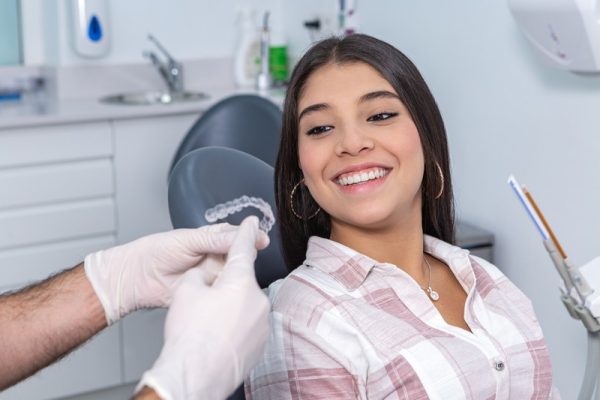How Can I Improve My Oral Hygiene Routine?
Maintaining healthy teeth and gums is key to your overall well-being. Good oral hygiene helps you prevent tooth decay, gum disease, and keeps your smile bright and fresh. Everyone can achieve a cleaner mouth with small changes to everyday habits, dedication, and simple practices.
Are There Ways to Boost My Dental Care Habits?
Selecting the Right Toothbrush and Toothpaste
The toothbrush type you use influences how well you clean your teeth and gums. Choose a soft-bristle toothbrush to prevent gum irritation and damage. Bristles should be gentle enough to clean without feeling too abrasive on your gums and enamel.
Opt for fluoride toothpaste to give added defense against cavities. Fluoride strengthens tooth enamel and helps prevent tooth decay. Avoid harsh toothpaste that can wear down enamel or irritate gums by using mild, dentist-approved products.
Mastering the Correct Toothbrushing Method
Brushing should involve gentle, circular motions while positioning the brush at a 45-degree angle to your gums. Brush lightly, as aggressive pressure can lead to gum erosion and enamel wear. Spend at least two minutes brushing in the morning and before bedtime.
Remember to brush the inner, outer, and chewing surfaces thoroughly to ensure cleanliness. Brushing your tongue also helps remove bacteria that contribute to bad breath. Replace your toothbrush every three to four months or sooner if the bristles fray.
Adding Dental Floss into Daily Habits
Flossing helps remove plaque and food debris between teeth, areas unreachable by a toothbrush. Take about 18 inches of floss and wrap most of it around your middle fingers. Glide the floss gently between each tooth, making a C-shape against each side.
While flossing, never snap or force floss into gums to avoid soreness or accidental injuries. Incorporate flossing at least once daily, ideally before bedtime. Regular flossing helps prevent gum inflammation, cavities, and bad breath.
Using Mouthwash to Complement Brushing
Mouthwash offers additional protection by reducing bacteria and freshening your breath. Choose an alcohol-free mouthwash to avoid dry mouth, especially if your mouth often becomes dry. Swish a suitable amount of mouthwash around your mouth for about 30 seconds after brushing and flossing.
Mouthwash is not a substitute for brushing or flossing, but an excellent addition to an oral hygiene routine. Use mouthwash twice daily to maximize its benefits. It contributes significantly to maintaining a healthy and fresh mouth environment throughout the day.
Maintaining a Tooth-Friendly Diet
Your diet greatly influences the health of your teeth and gums. Limit sugary snacks and drinks as they feed bacteria that produce acids capable of damaging teeth. Instead, include snacks such as cheese, yogurt, vegetables, and fruits to promote dental health.
Drinking ample water daily helps rinse food particles and bacteria from your mouth effectively. Incorporate calcium-rich foods into your diet for stronger teeth. Awareness in choices builds healthier oral hygiene practices over time.
Regular Visits to Dental Professionals
Scheduling periodic dental check-ups helps maintain oral health and catch potential issues early. Set dental appointments twice yearly for optimal preventive care. During visits, your dentist cleans teeth deeply, removing plaque and tartar build-up beyond regular brushing capabilities.
If dental issues arise between check-ups, consult a Pasadena general dentist swiftly to avoid complications. Quick action reduces discomfort and prevents worsening oral health issues. Routine care significantly helps maintain oral health.
Improving Oral Hygiene with Specialized Orthodontic Care
Misaligned teeth make cleaning difficult and may result in decay or gum disease. Treatments from professionals, such as an orthodontist Pasadena TX benefit overall oral health by straightening crooked teeth. Well-aligned teeth are easier to brush, floss, and maintain.
Orthodontic procedures like braces or clear aligners correct misalignment effectively. Seeking professional orthodontic guidance improves dental functionality, appearance, and self-esteem. Healthy aligned teeth enhance your smile and oral cleanliness.
Practicing Healthy Habits That Benefit Oral Health
Adopting habits beneficial to oral hygiene is essential in maintaining a healthy mouth. Smoking harms gum health, stains teeth, increases oral cancer risk, and worsens oral health conditions. Choosing to quit smoking enhances dental health significantly.
Reducing alcohol intake reduces dry mouth risk, gum disease, and contributes positively towards oral hygiene. Reducing habits harmful to teeth like chewing on ice or pens lowers risks of cracked teeth. Commitment to habits promoting cleanliness leads to better outcomes.
Staying Mindful of Indicators of Oral Problems
Early identification of oral issues reduces long-term complications effectively. Symptoms like gum redness, bleeding, persistent bad breath, or toothache require professional evaluation immediately. Track lingering discomfort to address dental concerns promptly.
Awareness of changes in oral health encourages immediate action. Early diagnosis and treatment simplify managing oral health conditions without extensive and expensive procedures. Proactivity keeps minor issues from becoming serious.
Choosing a Convenient Dental Care Location
Easy access to dental care enables steady routines and frequent check-ups. Select a dental office with a convenient location, like the suggestions brought by searches like professional dentist near me. Easy access ensures regularity in preventive dental appointments and timely treatments.
Accessibility removes barriers preventing consistent dental visits. Regular dental care builds strong communication with dental professionals and clear knowledge of personal oral health status. Convenience in location supports an ongoing commitment to oral health.
Two Easy Lists for Better Oral Care Practice
Easy-to-Follow Daily Oral Hygiene List
-
Brush teeth twice daily using fluoride toothpaste.
-
Floss once per day before night brushing.
-
Use mouthwash for added freshness post brushing.
-
Drink plenty of water throughout the day.
-
Limit sugary snacks and drinks.
Tips for Long-Term Oral Health Improvement
-
Visit your dentist at least twice annually.
-
Quit smoking and reduce alcohol consumption.
-
Replace toothbrush regularly every 3-4 months.
-
Stay informed and attentive to dental symptoms.
-
Eat tooth-friendly foods and maintain balanced diet.
Final Thoughts
Improving your oral hygiene routine is achievable through consistent daily practices and maintaining healthy lifestyle choices. Awareness and proactive strategies significantly influence your dental well-being. Ensure regular professional care for optimal oral health and confidence in your smile.





0